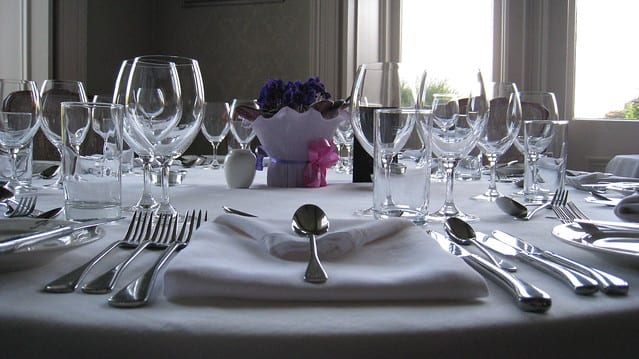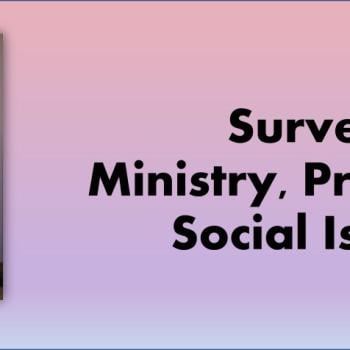The Rabbi Who Came to Dinner: An Imaginative Retelling of Luke 14:1, 7-24
The tablecloths are crisp and starched. The linen napkins are clean and folded in origami designs perched upon fine china plates that practically glow. The Waterford crystal glasses await artesian water poured by well-groomed and unobtrusive servers dressed in burgundy vests, white tuxedo shirts, black pants, and perfectly polished shoes. All is ready.

But the guests are nervous. Because they know they are being watched.
The string quartet plays a jaunty minuet as the guests politely but firmly choose seats as close as they can get to their host’s chair at the head of the table. Suddenly two men both reach for a chair at the same time. They begin tugging the chair back and forth murmuring as politely as possible, “No, I believe I was here first!”
Just then, the rabbi who had been standing at the back of the room watching this whole scene steps forward and clears his throat to speak. The violins squeak to a halt.
When you are invited by someone to a wedding banquet, do not sit down at the place of honor, in case someone more distinguished than you has been invited by your host; and the host who invited both of you may come and say to you, “Give this person your place,’ and then in disgrace you would start to take the lowest place. But when you are invited, go and sit down at the lowest place, so that when your host comes, he may say to you, “Friend, move up higher’; then you will be honored in the presence of all who sit at the table with you. For all who exalt themselves will be humbled, and those who humble themselves will be exalted. [Luke 14:8-11]
Conversation stops. The servers pause in mid-pour. All eyes move from the rabbi to the men who had been fighting over the chair, and then to the host at the head of the table.
This is just what they were afraid of. Why did they have to invite the rabbi? He’s always making trouble. Can’t he just keep his mouth shut? What’s the host going to do now? Jesus is ruining the meal.
Everyone watches to see what their host will do.
The man stands towering over his guests with a genial air. His full, dark beard is evenly trimmed, his suit perfectly tailored over his well-built frame. He surveys the room. These are his friends, his colleagues, and . . . his competitors. You know what they say: keep your friends close and your enemies closer.
They’ve all known each other since prep school.
Their fathers were in the same law firms and corporate board rooms. Their mothers served on the same charities. Their sisters were in the same sororities. Their families have shared the same pews in worship. They have dined at each other’s opulent homes for years. Always with an eye to whose wives displayed the finest table. Whose sons were the most athletic. Whose daughters wore the biggest diamonds. And whose cooks prepared the most succulent foods.
Tonight, it would be duck pate’ as an appetizer with a main course of roasted lamb and vegetables in a warm embrace of jasmine rice scented with herbs and spices. The fresh-baked bread would be served with truffled butter. For dessert, wine-poached figs encircling a generous slab of decadent cheesecake drizzled with dark chocolate sauce. The evening would be perfect.
“So why are you inviting that rabbi?” his wife had demanded as he added Jesus’s name to the guest list earlier that week.
The man had chuckled softly. “He amuses me. He’ll shake things up a bit. Think of him as entertainment for our guests. You want this to be a night to remember, don’t you, my darling?” And he kissed her lightly on the cheek.
Now his wife is looking at him from across the room, her eyes throwing daggers. He can hear her wordless, demanding gaze: “He is embarrassing our guests. Do something!”
The man lets out a booming laugh as if Jesus had just told a joke.
“Did you hear that, my friends! Listen to the wisdom of this man. Why, he is quoting Proverbs. Correct me if I’m wrong, Rabbi, but I believe the venerated sage says: ‘Do not put yourself forward in the king’s presence or stand in the place of the great; for it is better to be told, “Come up here,” than to be put lower in the presence of a noble.’ [Proverbs 25:6-7] Isn’t that right, Jesus?”
Some of the guests at the lower end of the table start to nod in agreement.
The host continues, striding up to Jesus and putting his arm around the rabbi’s shoulders.
“Why, shame on all of you for fighting over the best seats at the table. You’ve embarrassed yourselves with your posturing. We value a humble man who seeks the lowest chair, don’t we Jesus?”
The man gives his wife a wink that says, See? I’ve got this under control.
Then Jesus smiles and puts his arm across the shoulders of his host, like they’re best buddies from back in their university days on the rowing team.
He looks him in the eye and says with equal gusto: “When you give a luncheon or a dinner, do not invite your friends or your brothers or your relatives or rich neighbors, in case they may invite you in return, and you would be repaid.”
Then he pulls his arm away and moves to the window that looks out over the city. “But when you give a banquet,” he says, pointing to the outside, “invite the women from the domestic abuse shelter, the members of the Special Olympics team, the migrant workers in your fields. And you will be blessed, because they cannot repay you, for you will be repaid at the resurrection of the righteous.” [Luke 14:12-14]
The truffled butter softens quietly in its smooth serving dish.
A plume of steam from the roasted lamb wafts across the room undisturbed by any chatter. Because everyone is holding their breath, all eyes on Jesus. . . and their host.
The man’s smile does not falter, because he knows he is being watched. He locks eyes with the rabbi. He says nothing, but his slight squint communicates loud and clear.
“You’ve insulted my guests. You’ve insulted me. You’d better watch yourself, Rabbi. It won’t be tonight. It may not be next week or even next month. But you’ll pay for this. Oh, yes. You. Will. Pay.”
Just then, one of the dinner guests breaks the silence. “Blessed is anyone who will eat bread in the kingdom of God!” Breathing puffs of relief, the guests agree, nodding and murmuring, “Yes, blessed!”
Jesus, taking a seat at the lower end of the table, keeps his eyes on the host.
“Let me tell you another parable. A man gave a great dinner, but all his rich friends gave excuses as to why they couldn’t come. So you know what that rich man did? He sent his servants out into the streets and brought in the poor, the crippled, the blind, and the lame. And there was still room, so he invited everyone – foreigners, immigrants, Muslims, brown-skinned people, even Democrats, so that his house was filled! But not one of his rich friends was there to enjoy the party.” [Luke 14:16-24]
The women clutch their pearls. The men glare with arms crossed as their roasted lamb cools on their plates. The servants stifle their smiles and exchange secret glances.
Jesus leans over to the string quartet and says, “I’d love to hear a waltz!”
And so, the violins begin to play as the guests take their seats at the table.
The host sits silently staring at the spray of fresh flowers happily beaming from the perfectly polished vase at the center of the table. His wife breezes in to take her seat next to him. She leans over, her perfectly polished lips whispering into his ear.
“Well, you wanted this to be a night to remember, didn’t you, my darling?”
[Author’s note: A reader shared with me that she had once been invited to a fancy fundraiser meal for an organic farm that charged an exorbitant price per plate, effectively making the meal inaccessible to those without wealth. It is likely that the host of the fundraiser, as well as the ones who attended, were registered Democrats. Her comment pointed out to me the bias of my sermon, in that it implicitly critiques wealthy Republicans, when, in fact, there are also wealthy Democrats who are guilty of the same kind of economic elitism. So the sermon could have easily gone a different direction where Jesus could have encouraged these self-soothing affluent Democrats to invite the migrant workers from their organic fields to this dinner, as well as *gasp* Republicans!]

Leah D. Schade is the Assistant Professor of Preaching and Worship at Lexington Theological Seminary in Kentucky. She is the author of Preaching in the Purple Zone: Ministry in the Red-Blue Divide (Rowman & Littlefield, 2019) and Creation-Crisis Preaching: Ecology, Theology, and the Pulpit (Chalice Press, 2015).
Twitter: @LeahSchade
Facebook: https://www.facebook.com/LeahDSchade/
Read also:
A Fiery, Divisive Jesus? Luke 12:49-56 Through a Dialogical Lens
Sometimes Following Jesus Means NOT Being Neutral (Guest Sermon)
Owning Stuff or Stuff Owning Us? The Rich Fool in Luke Chapter 12













